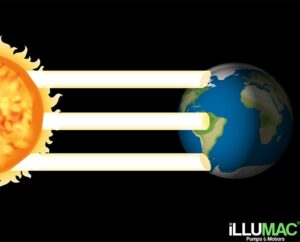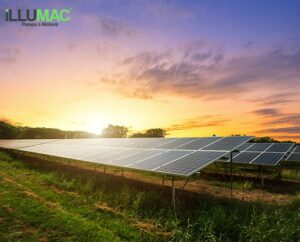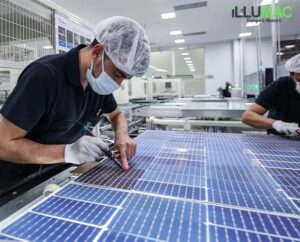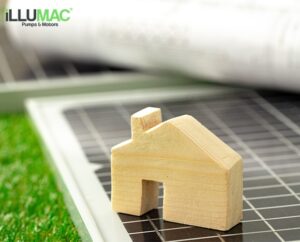This is a better time to make the switch than ever before. Over the last decade, technology has significantly improved, lowering the cost of rooftop solar systems while also making them less cumbersome and more aesthetically pleasing.
There are also financial benefits to consider. The federal tax credit is large enough to offset some of the high installation costs. The monthly savings on utility bills is something to look forward to. If you live in a sunny area, you could even consider a net-metering arrangement to receive credits for excess solar energy generated.
Not to mention the feel-good factor. You’d be able to replace your guilty conscience about using fossil fuel-generated grid energy with the exhilarating sensation of saving the environment.
Aside from that, you should give it some thought before proceeding with the purchase. This is not a decision to be taken lightly or casually because it is a significant investment that may necessitate structural or electrical modifications.
You should devote some time and effort to answering the following questions: What should I know about solar panels? What else should you know before installing solar panels?
1. What is your monthly average energy consumption?
This is one of the most important factors in determining the capacity of the solar power system you need to purchase. There are two methods for calculating this.
The first entails totaling the energy consumed by all major electrical appliances and devices in the home over the course of a month. You can accomplish this by looking up the wattage of each device and multiplying it by the number of operational hours. You will get watt-hours or kWh. One kWh is one unit of electricity.
For the second method, you’ll need 6 months or a year’s worth of utility bills. Calculate the average energy consumption.
However, when estimating the capacity of the solar system, you must also consider future energy demands. If you intend to purchase any major electrical appliances, you should factor this into your monthly energy consumption.
2. How much direct and indirect sunlight is there?
Even on cloudy days, a solar system can generate electricity using diffused sunlight. However, if your roof is shaded by trees or if your location experiences more rainy and cloudy days than sunny days, a solar installation may be uneconomical. The rooftop solar panels’ conversion efficiency would be pitiful.
To get the most out of your rooftop solar panel installation, it should be exposed to direct sunlight on the majority of days of the year. Cloudy or rainy days are tolerable on occasion. If this is not the case, you will need to install a larger system, such as monocrystalline solar panels, to meet your energy needs. Furthermore, it would be obvious that the higher the capacity, the higher the cost of installation.
3. What are the solar panel roof requirements?
In a location with average sunlight, 100-120 sq ft of roof space is required to generate 1 kWh of solar energy. If the amount of sunlight available is less than average, you may need more panels to generate the same amount of electricity. This would necessitate more space.
As previously stated, the type, shape, orientation, and tilt of the roof are all important considerations. If you are having difficulty performing a self-assessment, you can hire solar contractors to perform the assessment and provide you with an estimate.
Solar power may not be worth the effort and investment if your roof is not large enough to accommodate the solar panels or is not suitable for solar installation.
Even if your roof or location is unsuitable for solar installation, you can still make it work by selecting high-efficiency solar panels or solar tracking mounts. However, you should be aware that all of this will come at an additional cost.
Before purchasing a solar panel roof, you should be aware of the requirements.
4. Will it cause damage to the roof?
Not if your roof can withstand the weight and the installation is done correctly.
The solar panels and mounts will add significant weight to your roof. So, before you proceed with your solar plans, you should have a professional assess the quality of your roof and its ability to withstand the additional load.
If your roof is found to be insufficient or too old to support the weight of the solar panels, you still have a few options. You can install a new roof, completely renovate your roof, or add additional support to it. If you don’t want to do any of these things, you could look into installing solar panels in your yard.
5. Is your roof in need of repair?
Even if you discover that your roof is strong enough to withstand the weight and that all of the remaining conditions are met, it is important to remember to inspect your roof for repairs at this point. Other roofing components, such as flashing, vents, and underlayment, must be inspected for damage and replaced if necessary. Even if some of them do not require immediate attention, it is best to carry out repairs and strengthen the roof prior to installing solar panels.
The reason is straightforward. After you install rooftop solar panels, any work on the roof will necessitate removing and reinstalling the solar panels. This does not come cheap or easily. It is recommended that you identify and repair any existing or potential roof damage. You can also reinforce your roof with caulking and weatherproofing.
You may be aware that rooftop solar panels have a lifespan of 20-25 years. It is strongly advised to match the lifespan of your roof with that of solar panels in order to save time, effort, and money.
6. Is there a water drainage system in place?
There must have been a system in place for rainwater drainage when your roof was originally built. Installing solar panels, mounts, and other accessories can disrupt the natural flow of water. This can cause water to accumulate on the roofs, which can harm both the solar panels and the roof itself.
This factor must be considered before deciding on the location of the solar installation. Make sure that the rooftop solar system does not interfere with rainwater runoff.
7. Are you ready to deal with nature's wrath?
Each region has its own set of extreme weather conditions. If there are heavy rains somewhere, there will be heavy snow, high winds, hurricanes, or lightning storms somewhere else. With global warming wreaking havoc on weather patterns around the world, this can only get worse.
Because rooftop solar panels are exposed to the elements, you must take adequate precautions to limit the damage caused by these events. A local solar contractor will be able to help you with this.
8. Do you intend to use net metering?
Are you planning to go completely solar and off the grid? If this is the case, all you need to do is disconnect the current grid connection, if any.
A more popular option is to remain connected to the grid and use solar energy when it is available. This may necessitate additional equipment and changes to the main electric switchboard.
Another profitable option is to enter into a net-metering agreement. This requires that you remain connected to the grid via a bi-directional meter at the switchboard. This allows you to export excess energy produced during the day and draw energy from the grid when there is a power outage.
However, you must be aware of the net-metering formalities and conditions in your area. You may be required to apply for permission and pay fees. You must also determine how the utility company will compensate you for the energy exported and charge you for the energy consumed.
Compensation can be in the form of credits or cash. Rates may also be skewed against you. Learn how it works and make an educated decision.
9. How did you select a contractor?
How do you intend to find a solar contractor? It is not a good idea to simply Google for solar contractors near you. It would be preferable if you chose one based on recommendations from family or friends.
It is recommended that you check the contractor’s credentials before hiring them. The majority of states require only a general electrical license, but some require a special license for solar installation. You can also check their North American Board of Certified Energy Practitioners accreditation (NABCEP).
Because your relationship with your solar contractor will be long, it is highly recommended that they have a good track record and positive feedback. The contractor’s warranty terms serve as proof of their commitment. Although rooftop solar panels rarely require maintenance, they should be available to repair any problems that arise.
10. Did you conduct adequate research on solar contractors?
Before you sign on the dotted line, conduct extensive market research and identify at least three of the best solar contractors in your area.
You can contact them for an evaluation and estimate. Most of them will be happy to provide you with a free estimate. You will be ready to make your final decision after analyzing and comparing their various aspects.
Check that the contract includes the following points before you sign it.
- Financial information
- The installation’s ownership
- Guarantees of performance
- Service after the sale
- Who will have access to your solar installation’s data?
If there is an omission or ambiguity in any of these, raise your concern with the solar contractor. Avoid signing an agreement with which you are not comfortable.
11. How did you choose your solar panels?
Rooftop solar panels are available in a variety of efficiency levels and price points to suit a variety of locations and budgets. Choosing the cheapest option is not always the best option. If you want to get the most bang for your buck, consider all of your options, including your energy requirements, location constraints, and budget constraints.
Nowadays, the solar market is flooded with low-cost solar panels designed to entice buyers. Most of them have low efficiency and a short lifespan. In the long run, this will be more expensive than the more expensive options. Furthermore, they may pose a safety risk.
Before making a decision, weigh the pros and cons of rooftop solar panels on the market and consider your personal factors.
12. Do you fully understand the warranties?
As you are probably aware, a solar panel installation has a longer lifespan than most home appliances, lasting 20-25 years. This means that it should have a longer warranty period than a year or two, as with home appliances.
Most manufacturers provide a 20-year warranty on their products. The longer the warranty, the more likely it is that the equipment is a good buy. Some states that offer solar incentives have made equipment warranties mandatory.
Again, not all warranties are created equal. Before proceeding with the purchase, you should thoroughly understand it. Some examples of common warranty terms are:
- Solar panel warranty:
This can range from 15 to 25 years or even longer. Naturally, the more the merrier. However, don’t choose a solar panel with a warranty of fewer than 20 years because that is the industry standard.
This warranty should cover the minimum amount of energy output. During the warranty period, this should typically be 80% energy output.
- Installation warranty:
This covers losses caused by improper installation or broken/damaged/defective equipment. This can usually range from 2 to 10 years. This warranty covers labor in addition to defective parts in the equipment, roof damage, shipping damages, and replacement/repair of the defective parts. - Warranty for the inverter: The warranty period varies depending on the type of inverter used in the system. A standard string inverter has a warranty of 5-10 years. Generic microinverters have a 20-25 year warranty. These warranties typically cover manufacturing and material defects.
13. Have you thought about insuring the installation?
Do you know that you can insure against installation-related damages? This includes both property damage and equipment damage. Many states require insurance in order to qualify for rebates and other financial incentives for solar installation.
Even if you do not receive any of the benefits, you may be required to ensure the installation as a legal requirement and part of the building code. Because these rules are not the same everywhere, you should double-check with your local solar contractor.
14. Did you take advantage of any tax credits or rebates?
A solar power installation can cost between $20,000 and $30,000, or even more. This is a significant sum for the majority of households. Financial incentives, such as tax credits and rebates, are, however, provided by federal, state, and local governments, as well as solar companies.
Before making a purchase, try to gather as much information as possible about the various incentives available to you. Your solar contractor might be able to help you with this.
Because the Indian government is so enthusiastic about solar energy, the Department of Energy is offering nearly 30% off the cost through tax credits and rebates. In addition, you may be eligible for additional incentives from utility companies.
15. Do you intend to install solar panels on your own?
If you are considering DIY as a cost-cutting measure, think twice. Go ahead and save some money if you are well-qualified and equipped to do the installation. However, if this is not the case, you should refrain from doing so. Professionals should be hired to install solar panels.
For this job, rules and regulations require a minimum electrical license. A specialized solar license is required in many states. This is due to the fact that so many things can go wrong during the installation. You may find it difficult to handle the situation, or you may handle it incorrectly unless you have been trained for it.
Roof damage: If the holes are not drilled correctly, the sealing is not done properly, or the mounts are not properly installed, your roof may begin to leak.
Wiring issues: The solar energy installation involves a lot of wiring, both on the roof and inside the home. An electric shock or a short circuit can occur if something goes wrong anywhere. This can be hazardous to you, your family, and the system as a whole.
Rules compliance: If you are taking advantage of financial incentives, you may be required by law to have the installation done by a professional. To receive warranty benefits, most solar companies require installation by a licensed professional. This means that if something goes wrong while self-installing solar panels, you will lose money.
Furthermore, you may be unfamiliar with the various rules and regulations governing solar installation. If the paperwork is not completed correctly, your request may be denied.
16. Have you considered the costs of upkeep?
This is one aspect you may choose to overlook at the time of purchase. Regular maintenance is essential to the smooth operation of the solar panel system. It is strongly advised to have a thorough understanding of the requirements and costs involved. Your solar contractor can assist you with this.
Rooftop solar panels do not require much maintenance, but they will not function properly if they do not. If you find the maintenance requirements too difficult to handle on your own or too expensive to outsource, you should be aware that the efficiency of the solar panels will be lower and the lifespan will be shorter.
What should you know before going solar?
As you can see, there are numerous factors to consider prior to installing solar panels. You can make an informed decision about whether solar is right for you if you take the time to research and understand all of the benefits and drawbacks of this decision.
If you decide that going solar is the best option for you, do your homework and ask for references from reputable installers in your area. And, for the best results, work with a qualified installer.
Installing solar panels can help you save money on your energy bills while also lowering your carbon footprint.






